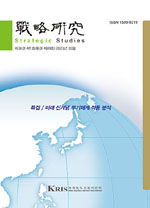- 영문명
- The Strategic Flexibility of United States Forces Korea and the Future of ROK-US Military Cooperation Relation
- 발행기관
- 한국전략문제연구소
- 저자명
- 문장렬
- 간행물 정보
- 『전략연구』통권 제34호, 172~206쪽, 전체 35쪽
- 주제분류
- 사회과학 > 정치외교학
- 파일형태
- 발행일자
- 2005.07.31
7,000원
구매일시로부터 72시간 이내에 다운로드 가능합니다.
이 학술논문 정보는 (주)교보문고와 각 발행기관 사이에 저작물 이용 계약이 체결된 것으로, 교보문고를 통해 제공되고 있습니다.

국문 초록
영문 초록
This paper is to analyze various effects that the USFK’s strategic flexibility of recent concerns and controversies will have on the future of the ROK-US military cooperation relation, and to search for a desirable policy alternative that ROK can adopt regarding the matter. The strategic flexibility can be defined as a function or a character of US overseas forces to carry out the mission by flexibly projecting its capability to any place as necessary, rather than limiting it for a fixed mission at a particular stationing area, in order to protect the strategic interests. This means for the USFK to be able to play a ‘regional role’ in Northeast Asia beyond the traditional function focused on deterring North Korean military threats, and for this purpose, to acquire freedom to flow in and out of Korean Peninsula including the right to use bases and facilities therein. US global and East Asia strategies since the end of the cold war has undergone a fundamental change in a new international security environment, and Bush Administration is pushing ahead the Global Defense Posture Review with a realignment of alliance policy based on the Military Transformation strategy. ROK and US has repeatedly affirmed through the Security Consultative Meeting a principle that both country should make a common effort to maintain peace and stability in Northeast Asia, continued discussing the role of USFK and ROK-US alliance along with the so-called ‘Koreanization of Korean defense,’ and will consult more concretely on this issue in channels like the Security Policy Initiative. The increase of USFK’s strategic flexibility turns out to have many political and military implications. On the one hand, the USFK will be able to more smoothly manage the regional crises by expanding its scope of action outside Korean Peninsula and acting as a rapid maneuver force, the integration of the US forces stationed in the Northeast Asian region may be expedited to effect the new system of missions, and the combined capabilities of USFK and USFJ(Japan) for strategic check against China can be enhanced. On the other hand, the role sharing between the USFK and Korean armed forces will be readjusted, the ROK-US alliance itself may have a regional character, and the alliance can be further strengthened and developed toward a more comprehensive relation. However there exist some negative aspects that the security risk on the part of ROK might be rather increased in such cases as it gets unwillingly involved in US-China conflicts or entitled to receive a direct collateral damage in the event of US military actions against North Korea. Taking these implications into consideration, we analyze a spectrum of alternatives that ROK may select in the scope of allowing USFK’s strategic flexibility, and propose, as a realistic option to protect its national interests, ‘conditional and limited strategic flexibility for the defensive regional risk management.’ That is, any implementation of the USFK’s strategic flexibility should satisfy the following three preconditions: the commitment for the defense of ROK should not be degraded, the security of ROK should not be imperiled by entrapment, and peace and safety of Northeast Asian region should not be endangered. Also a procedure of its conduct should be established that requires a prior consultation with ROK even though certain kinds of pre-actions could be permitted in some restricted cases. Along with this, based on an understanding that the issue of USKF is related to almost every other aspect of ROK security, we suggest key policies in several dimensions that should be carried out concurrently such as maintaining and developing the ROK-US alliance, strengthening the ROK-China relation, continuously driving the reconciliation and cooperation policy toward North Korea, making efforts to establish the regional multilateral security regime, and improving the independent defense capability.
목차
Ⅰ. 서론
Ⅱ. 탈냉전 이후 주한미군의 역할 논의
Ⅲ. 주한미군의 전략적 유연성 증대의 함의
Ⅳ. 한국의 대응 전략
Ⅴ. 결론
키워드
해당간행물 수록 논문
- [특집:격변기 동북아 4강의 신 군사전략과 안보] Military Strategy and Prospects for the Korean Peninsula: Security in the Second Bush Administration
- [특집:격변기 동북아 4강의 신 군사전략과 안보] “Strong Russia” Policy of the Putin Ⅱ Government and Prospects for Security on the Korean Peninsula
- [시사 포커스] 중국의 군사력증강 동향과 전망
- [서평] 탈냉전기 동북아시아와 북한의 역학관계
- [기획연구] 미사일 방어체제의 개념과 쟁점
- [기획연구] 주한미군의 전략적 유연성과 한·미 군사협력 관계의 미래
- [특집:격변기 동북아 4강의 신 군사전략과 안보] FOR PEACE, STABILITY AND COMMON PROSPERITY THROUGH DIALOGUE AND COOPERATION
- [기획연구] 군사전략관점의 한미안보동맹 현안분석
- [특집:격변기 동북아 4강의 신 군사전략과 안보] Japans National Defense Program Guideline (NDPG) and Prospects for Korean Peninsular Security
참고문헌
관련논문
사회과학 > 정치외교학분야 NEW
- Korea Observer Vol 56, No 3 Contents
- Social Values, Market Forces, and Government Intervention: Institutional Models and Policy Preferences in Cultural Policy Transformation of China and South Korea
- US-Japan-Korea Trilateral Cooperation: Analyzing the Implications for Korea Within the Context of US Alliance Control and Cost
최근 이용한 논문
교보eBook 첫 방문을 환영 합니다!

신규가입 혜택 지급이 완료 되었습니다.
바로 사용 가능한 교보e캐시 1,000원 (유효기간 7일)
지금 바로 교보eBook의 다양한 콘텐츠를 이용해 보세요!



